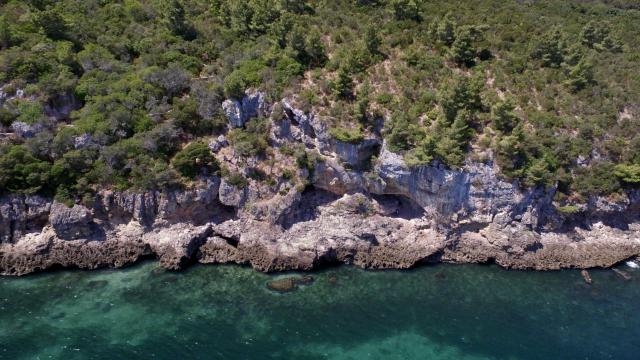Neanderthals living in Portugal during the last ice age consumed copious amounts of seafood, according to new archaeological evidence. The discovery suggests Neanderthals, like our modern human ancestors, made the most of marine resources.
Marine food resources such as fish, eel, mollusk, and crab were staples of the Iberian Neanderthal diet for tens of thousands of years, according to research published today in Science.
Neanderthal garbage piles, known as middens in the parlance of archaeologists, containing traces of marine-sourced foods were discovered at the Figueira Brava site on Portugal’s Atlantic coast. The dietary waste in these middens, such as discarded bones and shells, were radiocarbon dated to between 106,000 and 86,000 years ago, pointing to the intense and consistent use of marine resources by Neanderthals in this region for an extended period of time, according to the new paper.
What’s more, these Neanderthals also consumed land animals such as waterfowl and deer, pointing to a diet that can only be described as surf “˜n turf, as one researcher put it. But to the authors of the new study, led by archaeologist Joao Zilhão from the University of Barcelona, this means Iberian Neanderthals weren’t just hunter-gatherers”they were fisher-hunter-gatherers, in a discovery that’s further narrowing the behavioural gap separating Neanderthals from early modern humans.
That Neanderthals exploited marine resources is a contentious issue among some scientists, owing to the inconsistent archaeological evidence.
Back in 2008, for example, paleoanthropologist Chris Stringer and his colleagues published evidence showing that Neanderthals living at two cave sites in Gibraltar made use of marine food resources, but “there were criticisms at the time that this behaviour was probably rare and sporadic in Neanderthals, compared with the much richer material from contemporary early modern humans living close to the coasts of southern Africa,” explained Stringer, a researcher from the Museum of Natural history in the U.K. who wasn’t involved with the new study, in an email to Gizmodo.
Indeed, early modern humans, otherwise known as Homo sapiens, living in southern Africa during this same time period”the Middle Pleistocene”were most certainly munching away on seafood, as evidenced by their copious consumption of shellfish some 160,000 years ago. The lack of evidence for this behaviour among Neanderthals led to the belief among some archaeologists that marine diets were strictly the domain of modern humans.
It’s important to resolve this debate, because seafood is a rich source of brain-boosting fatty acids. Marine diets, therefore, could’ve played an important role in human history, Neanderthals included.
That said, evidence does exist of Neanderthals exploiting marine resources, aside from the aforementioned Stringer paper.
[referenced url=” thumb=” title=” excerpt=”]
Neanderthals collected shells, which they used for tools. The new discovery at Figueira Brava is important because it’s the most extensive evidence yet to show that Neanderthals were consistently living off marine resources, at least in coastal Iberia. The new discovery also demonstrates striking behavioural similarities between Neanderthals and early modern humans.
The paleontological and archaeological materials collected at Figueira Brava included evidence of mollusks, crabs, and fish (including eels), but also waterfowl, red deer, horses, and even pine nuts. The researchers also found evidence of stone tools and other artifacts.
“The variable but consistent signal of these behaviours across multiple archaeological layers at Figueira Brava provides robust evidence of systematic, long-term coastal adaptations by Neanderthals during the Pleistocene,” wrote archaeologist Manuel Will from the University of Tübingen in an accompanying Science Insights article. The new study “refutes the theory that Neanderthals were not able to efficiently extract diverse ocean resources in large quantities,” said Will, who wasn’t involved in the new research. He added a note of caution: “one archaeological site does not make a pattern.”
Stringer said the new study “adds greatly to the data showing that Neanderthals were certainly well-adapted to living off marine and coastal resources,” but “we still need more evidence on the wider picture of Neanderthal versus modern behavioural similarities and differences before we can claim complete behavioural equivalence between them.”
These concerns notwithstanding, the new paper does suggest a fishing-hunting-gathering lifestyle for the Iberian Neanderthals during the Middle Pleistocene.
As to why similar sites have not been found elsewhere, Zilhão and his colleagues speculate that other Neanderthal sites were washed away when sea levels rose at the end of the last ice age, particularly those in coastal Europe. If that’s the case, it may be tough to find additional evidence elsewhere.
Hey, no one said archaeology was going to be easy, but we continue to get closer to the truth with each passing discovery.
